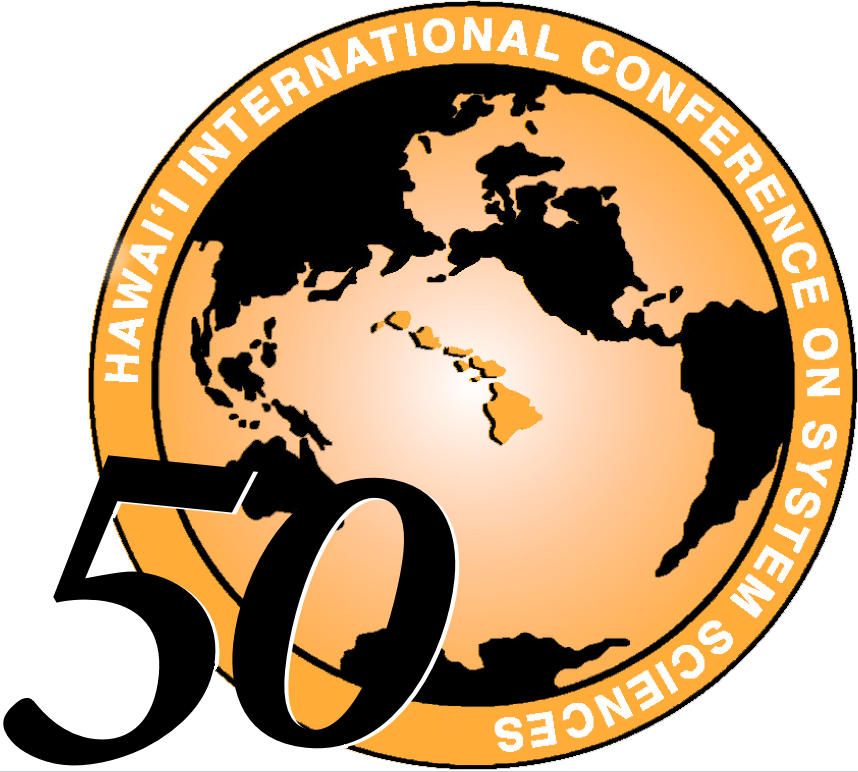HICSS - 50 E-Government Track
50th Hawaii International Conference on System Sciences
January 4-7, 2017 - Hilton Waikoloa Village, Big Island, HI, USA
Overview
Minitracks
Symposia and Workshops
Other Links
Government and Disaster Resilience



Minitrack Description
The 21st Century has been termed “the century of disasters.” Worldwide there were twice as many disasters and catastrophes in the first decade of this century as in the last decade of the 20th Century. All continents are affected, both directly and indirectly. And the trend continues, fueled by climate change, demographic changes and social dynamics. The serious challenges facing government in cities, regions and nations of the world relate to acute shocks (such as forest fires, floods, earthquakes, tsunamis, pandemics and terrorist attacks) and chronic stresses (such as high unemployment, inefficient public transport systems, endemic violence, chronic shortages of food and water).
Now we are in the era to consider how to deal with these unexpected consequences, not only preventing it before it happens. In other words, we should develop a disaster-resilient community to adapt the society to this new world. This minitrack features government (national, regional and municipal) roles in developing disaster resilience since they are responsible for saving lives of citizens, coordinating relief operations with different organizations and so on. In addition to this, roles of information systems and technologies to enhance disaster resilience and capability of the government are also essential to discuss.
We invite papers that deal with any aspect of the analysis, design, development, deployment, implementation, integration, operation, use or evaluation of ICT for discussing government roles for disaster resilience.
Minitrack topics include, but are not limited to:
- Response management systems and frameworks
- Recovery frameworks
- Hazard-specific and all-hazard planning frameworks and technologies
- International disaster response collaborations
- Early warning systems
- Current practices in incident management
- Identified and potential pitfalls in incident management
- Situational awareness and the common operating picture—practices and challenges
- Real-time and ICT-supported analysis of social media for gaining disaster intelligence
- Mobile devices as sensors and incident management tools
- Resilient information and communication infrastructures (FirstNet, etc)
- Data-science approaches to real-time data collection and analysis in disasters
- Government’s role in building resilient communities
- Preparedness and mitigation via resilient infrastructures
- Lessons from recent disaster responses
- Vulnerabilities in government response infrastructures (in particular, ICT infrastructures)
- Interoperability of ICTs used government disaster response management
- Emergency Operations Center ICTs and their effectiveness
- Reconnaissance technologies
- Disaster Management-related education and training
- Complexity management in disaster response
More information on the mini-track chairs:
Mihoko Sakurai, PhD, is currently Postdoctoral Research Fellow at the University of Agder (Norway), Department of information systems. Her academic background is Information Systems and Policy Design. She received her PhD from the Keio University’s Graduate School of Media and Governance in Japan. She has studied effective ways of using Information Communication Technology in Japan’s municipal governments. After the devastating Great East Japan Earthquake in 2011, she conducted field research and designed information systems to enhance the handling of future and unexpected disasters, especially for municipalities which have to deliver disaster relief operations to their residents. She is also an affiliate of Keio University as a researcher. Currently she is working on the notion of resilience and how information systems can support this. Her works related to the earthquake won the Best paper award at ITU Kaleidoscope conference (2013) and HICSS (2016). Her works has also been published in IEEE communications magazine, ICIS (International Conference on Information Systems) and ISCRAM (International Conference on Information Systems for Crisis Response and Management).
Emma S. Spiro, PhD, is an Assistant Professor at the University of Washington Information School. She is also an Adjunct Assistant Professor in the Department of Sociology, and an affiliate of the UW Center for Statistics and the Social Sciences. Dr. Spiro studies online communication and information-related behaviors in the context of emergencies and disaster events. Her work also explores the structure and dynamics of interpersonal and organizational networks in both online and offline environments. Her research has been published in Social Networks and the International Journal of Information Systems for Crisis Response and Management. She has also won Best Paper awards at WebScience and the Neural Information Processing Systems Workshop on Social Media and Social Networks. Dr. Spiro earned her Ph.D. in Sociology from the University of California, Irvine. She also holds a B.A. in Applied Mathematics and a B.A. in Science, Technology, and Society from Pomona College, as well as an M.A. from the Institute for Mathematical Behavioral Sciences at University of California, Irvine.
Jose J. Gonzalez (dr.rer.nat., University of Kiel, Germany, dr.techn., Norwegian University of Science and Technology, Norway) has long experience as professor of ICT and information security at the University of Agder and as adjunct professor of information security at the Norwegian University for Science and Technology, both in Norway. He founded and directed 2011-2014 the Centre for Integrated Emergency Management at the University of Agder, http://ciem.uia.no, an interdisciplinary research centre with a strong representation in information systems, IT technology and humanitarian science. Dr. Gonzalez has published in leading journals and conferences on system dynamics modeling, information security, critical infrastructure, organizational learning and Interactive Training Environments. Many of these papers are the result of international cooperation involving an extensive network of German, Norwegian, Spanish, Swedish and American partners. Among the most recent large-scale projects led and coordinated by Dr. Gonzalez are AMBASEC (funded by the Research Council of Norway and the Norwegian Oil Industry Association), dealing with incident response and handling in Integrated Operations in the oil & gas sector. Dr. Gonzalez also participated in the recent SEMPOC project, funded by the EU through the European Programme for Critical Infrastructure Protection. Finally, Dr Gonzalez had a leading role in the development of the Smart Mature Resilience project, a 5.4 million USD project funded by the European Union that started June 2015. The project involves 13 partners (4 universities, 2 major non- profit organizations and 7 European cities).
Co-Chairs
Mihoko Sakurai
(Primary Contact)
University of Agder
Department of Information Systems
Post Box 422
4604 Kristiansand, Norway
Phone: +47-3814-1902
Email: mihoko.sakurai@uia.no
Emma Spiro
The Information School
University of Washington
Mary Gates Hall Ste 370
Seattle, WA 98195, USA
Phone: +1-206-616-7395
Email: espiro@uw.edu
Jose J. Gonzalez
University of Agder
Centre for Integrated Emergency Management
Service Box 509
NO-4898 Grimstad, Norway
Phone: +47-3723-3240
Email: josejg@uia.no
